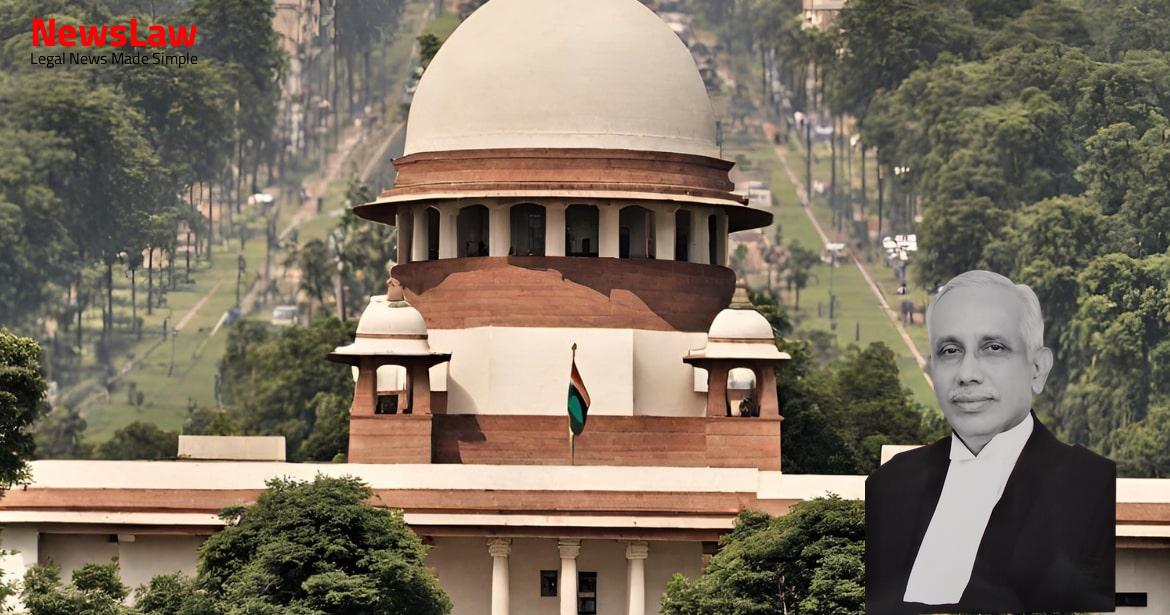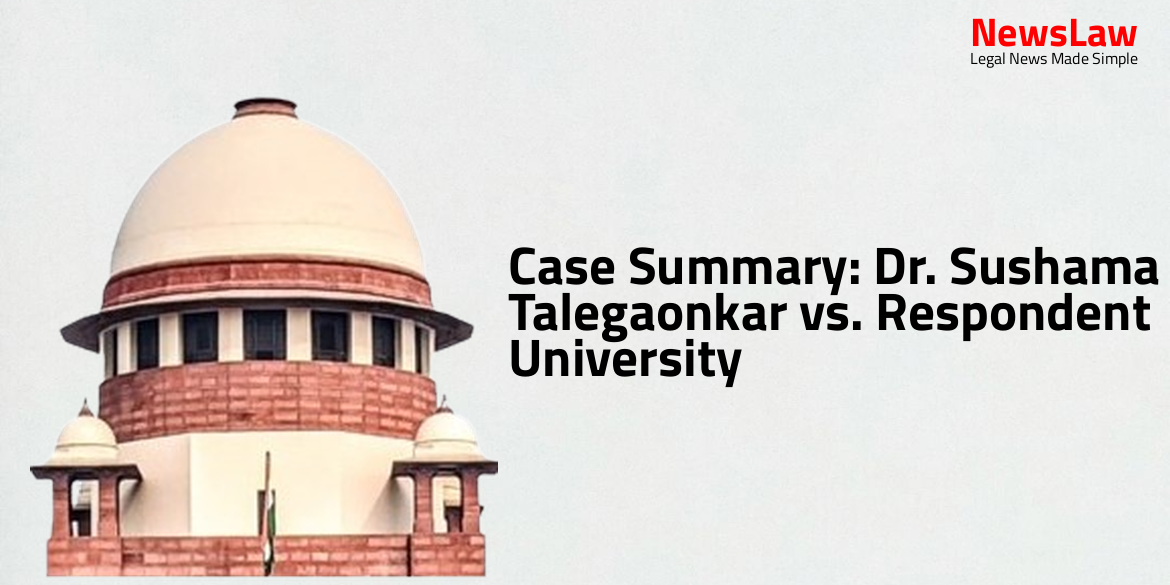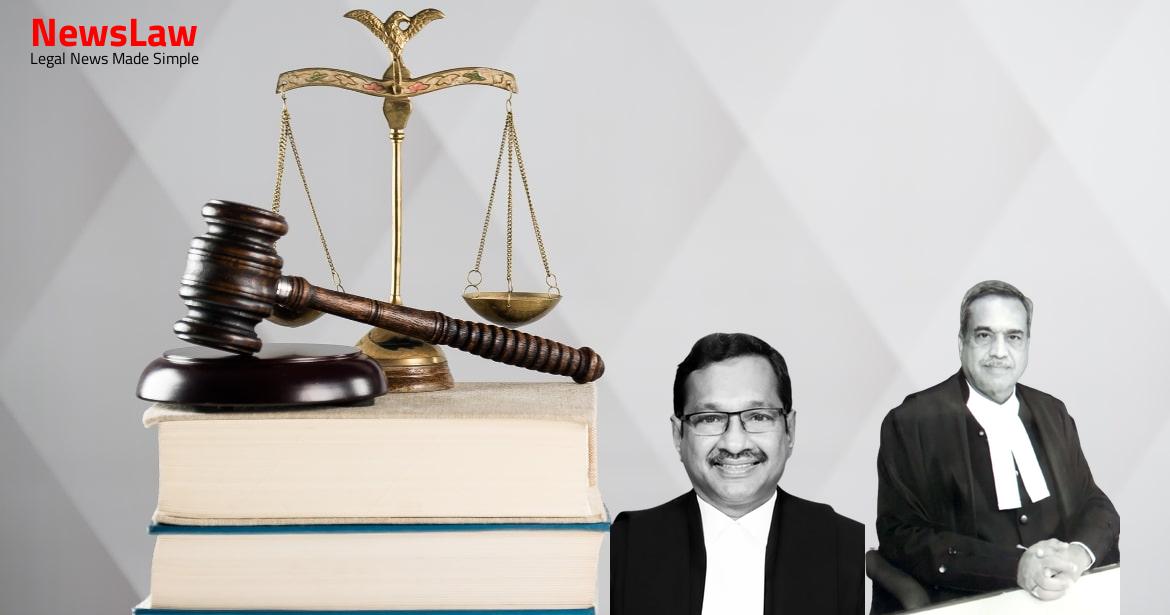In a significant legal ruling by the Supreme Court of India, the case of Specific Performance Suit Impleadment involving the Original Plaintiffs and the Appellant was decided. The issue at hand revolved around whether a person could be compelled to be involved in a specific performance suit against their will. Stay tuned for a detailed summary of the judgment!
Facts
- The appellant was aggrieved by the order allowing him to be joined as a party defendant in the suit filed by the original plaintiffs – respondent nos. 2 & 3.
- The original plaintiffs filed a writ petition before the High Court challenging the order allowing the appellant to be joined as a party defendant.
- The High Court, in its judgment dated 3.7.2013, allowed the writ petition and set aside the order of the trial court, stating that the appellant was not a necessary or formal party as no relief was claimed against him.
- The appellant then filed a review application which was dismissed.
- Hence, the present appeals have been filed by the appellant against the judgment of the High Court quashing the order allowing his impleadment.
- Original plaintiffs filed a suit against Original Defendant No.1 for specific performance of the agreement to sell/contract dated 3.5.2005.
- An injunction was in place against Original Defendant No.1 not to alienate or transfer the suit property during the pendency of the suit.
- The trial Court allowed the application to add the appellant as a defendant in the suit.
- The appellant claimed to have purchased the suit property and had a direct interest in it.
- Original Defendant No.1 executed a sale deed in favor of the appellant on 10.07.2008.
- The appellant applied for impleadment as a defendant in the suit under Order 1 Rule 10 of the CPC.
Also Read: Urs Family Property Dispute: Supreme Court Decree
Issue
- The main issue before the court is whether the plaintiffs can be forced to involve a person in a specific performance suit against his will.
- The specific concern is regarding a person who has not been implicated in any claim for relief by the plaintiffs.
- The court needs to determine if such compulsion is permissible under the circumstances of this case.
Also Read: Promissory Estoppel and Public Interest: Union of India vs. M/s Dharampal Satyapal Ltd.
Arguments
- The appellant filed an application to implead themselves in the ongoing suit as a defendant.
- The appellant purchased the suit property from the same vendor as the original plaintiffs.
- The appellant was a prior agreement to sell holder and deemed to be a necessary and proper party to protect their interests.
- The Bombay High Court decision in Shri Swastik Developers vs Saket Kumar Jain was referred to support the impleadment.
- The original plaintiffs opposed the appeals stating that the appellant bought the property during the suit in violation of a court injunction.
- The original plaintiffs claim the prior agreement to sell presented by the appellant is fabricated.
- The original plaintiffs argue that without their consent, no one can be impleaded as a defendant in their suit for specific performance.
- The issue is said to be covered against the appellant by the decision in the Kasturi v. Iyyamperumal case.
- The appellant’s counsel contends that the trial court’s decision to implead the appellant should not have been overturned by the High Court under Article 227.
- The appellant’s reliance on the Robin Ramjibhai Patel case and the Shri Swastik Developers case is disputed by the original plaintiffs’ counsel.
- As per the judgement in the case of Kasturi, it is the responsibility of the plaintiff to implead a specific person as a defendant, and if they do not do so, it is at their own risk.
- The plaintiff cannot be compelled to include a person as a defendant against their wishes, especially if that person is not a party to the contract.
- The decisions mentioned by the Senior Advocate for the appellant do not apply to the current case as per the submissions made.
- The judgement in the case of Kasturi is deemed to settle the issue and be directly relevant to the current case.
Also Read: Jurisdictional Interpretation in Kamlesh Babu v. Lajpat Rai Sharma
Analysis
- The Court did not accept the submission of adding a third party or a stranger to a contract in a suit for specific performance of the contract to sell as they are not necessary parties and have no semblance of right to relief against the party to the contract.
- If a decree is obtained for specific performance against certain parties, the Court will direct the execution of the deed of sale, and the appellant must put the decree into execution for possession.
- Decrees passed in such suit will not bind parties who were not originally involved, and they can take steps to protect their possession or file an independent suit.
- A suit of one character cannot be converted into a suit of a different character by adding third parties or strangers to the contract.
- The principle that the plaintiff is the dominus litis and cannot be forced to add parties against whom they do not want to fight, except under a compulsion of the rule of law, was considered.
- Adding third parties in the suit would lead to a complicated litigation beyond the scope of the original suit for specific performance.
- Decree in a suit for specific performance cannot affect the rights of parties not originally involved in the suit.
- Adding parties would enlarge the scope of the suit from specific performance to a suit for title and possession, which is impermissible in law.
- In a suit for specific performance, a necessary party is one against whom there is a right to the same relief as claimed, relating to the subject matter of the contract.
- A proper party in a suit for specific performance is necessary to adjudicate the controversy involved.
- Presence of parties before the court is necessary to settle all questions involved in the suit.
- A third party cannot be added in a suit for specific performance merely to determine possession or avoid multiple suits.
- Court can only examine the contract between the vendor and the parties to whom the agreement to sell is executed in a specific performance suit.
- Plaintiff cannot be forced to join third parties in a specific performance suit, even if they claim title and possession.
- Two tests must be satisfied to determine a necessary party in specific performance suits.
- Parties claiming independent title and possession adverse to the vendor’s title are not proper parties in a specific performance suit.
- Court cannot decide the title and interest of strangers to the contract in a specific performance suit as it cannot be turned into a regular title suit.
- The jurisdiction of the court to add parties not made party by the plaintiff in a suit doesn’t arise.
- The principle of ‘dominus litis’ applies, giving the plaintiff the right to decide against whom to fight in a specific performance suit.
- The decisions of Robin Ramjibhai Patel and Shri Swastik Developers are not applicable to the current case.
- In those cases, the plaintiff submitted an application to implead third parties/subsequent purchasers claiming title under the vendor of the plaintiff.
- The situation is different when the plaintiff opposes an application for impleadment of a subsequent purchaser as a party.
- In the case at hand, the distinguishing feature is that the appellant cannot be impleaded as a defendant in the suit for specific performance against the wish of the plaintiffs.
- The High Court’s view aligns with this distinction and there is no need for interference by this Court.
- The decisions in Kasturi’s case and the two other mentioned cases differ in this aspect.
- Consistent with the High Court’s reasoning, the appellant cannot be added as a defendant in the specific performance suit.
Decision
- The present appeals have been dismissed.
- No costs have been ordered in the case.
- The decision is based on the facts and circumstances of the case.
Case Title: GURMIT SINGH BHATIA Vs. KIRAN KANT ROBINSON
Case Number: C.A. No.-005522-005523 / 2019



